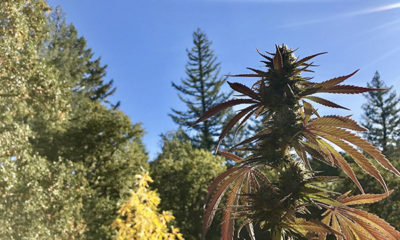
Joint Opinions
Legal Pot Isn’t Villain in Vape-Disease Epidemic, But It Could Be the Solution
Illegal products have been connected to the outbreak of mysterious lung ailments as appeals for federal regulation appear more and more obvious.
The Food and Drug Administration was created more than a century ago because for many years, the food and drugs Americans consumed were causing them to fall ill and die. As future generations discovered, product safety standards — just like speed limits, seatbelt laws, and public smoking bans — tend to save lives. Regulation, while often messy and imperfect, tends to work.
This lesson is something to keep in mind when processing the outbreak of serious lung problems among vaporizer users still spreading across the United States. According to the latest estimate from the Centers for Disease Control and Prevention, the vape-related lung disease “epidemic” has of Sept. 12 sickened at least 380 people across 36 states, six of whom have died. Like the Seattle-area team who is Washington state’s first confirmed case or the Los Angeles-area 18-year-old woman hospitalized last month, many victims appear to be otherwise healthy young people.
Amid the parade of victims, so far, no clear villains have emerged — aside from various parties’ predictable hobbyhorses. Out of this noise, only one reasonable explanation for the sickenings has emerged. Someone is out there selling unsafe products. Consumers need safe alternatives, or at least safer ones, and a guarantee that that’s what they’re getting.
We need to legalize cannabis nationwide and properly regulate products in order to keep folks safe.https://t.co/Txw3w0k8fu
— Julián Castro (@JulianCastro) September 11, 2019
Most people sickened have experienced symptoms consistent with “lipoid pneumonia,” a rare condition that occurs when fat particles enter the lungs, resulting in severe inflammation. The oils in certain liquids or other solutions used in vape cartridges could be the source of the inhaled fats. Could be, but we don’t know. And though the problem is yet to be identified, proposed solutions are coming hard and fast.
Libertarians who vape (and vote!) are casting President Donald Trump as a socialist turncoat for demanding a ban on flavored e-liquids while the FDA can hammer out reasonable regulations. The FDA, meanwhile, which has failed to regulate vaporizers of any kind and this summer announced that any regulations would have to wait until 2022, looks very much like the epitome of regulatory capture.
Public health officials, anti-smoking advocates and doctors, who for years have been consistently warning us for years that nobody knows the long (or even medium!) term effects of vaping, are showing restraint and not taking an enormous “I told you so” parade, instead advising us not to vape anything, ever, until we figure this out.
And since for some of us, all matters are cannabis, the country’s leading anti-legalization group capitalized on the fear and confusion to try and pin blame on “Big Marijuana” (despite the inconvenient truth that large or small, legal cannabis companies are forbidden from engaging in interstate commerce).
Because the vape illness outbreak is both poorly understood and affecting youth, it is the perfect trigger for a moral panic. And since they have affected a still-unknown amount of people, with the number changing daily, they are difficult to put in a rational context. THC products specifically and marijuana generally have received some blame — even though, as cannabis-industry trade groups pleaded for the public to remember, strictly regulated products bought in legal states have yet to be tied to any illnesses — and, it bears mentioning, the illness cluster in California occurred in a county that’s chosen to ban legal cannabis retail outlets entirely, leaving demand to be fulfilled instead by the underground market.
Meanwhile, authorities in Wisconsin have made what appears to be the nation’s first large-scale bust of an illicit vaping operation. According to Chicago-based ABC7, police arrested a pair of brothers who filled as many as 5,000 vapor cartridges per day with homemade THC oil — seizing 31,000 filled cartridges and 98,000 empties along with cash and “dozens of mason jars with THC,” the station reported.
It’s not yet known if the brothers’ cartridges, which sold for $16 each, were filled with any dangerous ingredients. But they could be! And it would appear that the mere existence of such a massive and massively profitable organization is proof that there is significant demand for vaporizer products, despite everything health officials have told us. The smart move, then, would seem to be what New York magazine business writer Josh Barro suggested on Sept. 11 and what presidential contender Julian Castro echoed: legalize
It may yet turn out that there’s some connection between vaping oil and suffering a lung ailment caused by excessive oil in the lungs. It might, it might not. What should happen is a recognition that the vaporizer epidemic exists on a long continuum. The free market, left to its own devices, will introduce all manner of products to consumers that may be dangerous or deadly. Profit is amoral in that way. Regulation may not solve everything overnight or halt wrongful or unfair deaths ever — ask any cyclist — but it seems obvious that it’s where action should start. In this, the FDA has been delinquent.
TELL US, do you that the FDA should regulate vapes?























